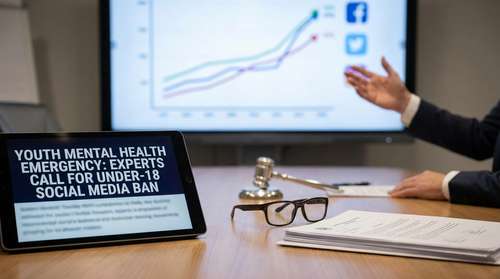CRISIS FATIGUE
[caption id="attachment_18783" align="alignnone" width="2560"]

Credit: Mel Elias via Unsplash[/caption]
Crisis fatigue is not a medical diagnosis, but it is used to explain a condition of burnout as a result of chronic stress caused by stressful events. Although it is not formally identified as a medical condition, studies have shown that people who experience crisis fatigue often have mental or physical symptoms.
People suffering from crisis fatigue often experience stress or flight response in their bodies. They may have difficulty breathing or sweat a lot more than usual. Muscle tension and an increased heartbeat can also be a symptom. The body can regain itself if the person feels safe within a short period or regresses into a more stress-induced phase.
What Causes Crisis Fatigue?
[caption id="attachment_18784" align="aligncenter" width="612"]

Credit: Adobe Stock[/caption]
Crisis Fatigue often results from extremely stressful or challenging events that a person's body can not handle. Some of the significant causes of crisis fatigue are;
Pandemics, Natural Disasters, Wars, Political Instability, Famine, e.t.c.
6 Tips For Handling Crisis Fatigue
Crisis Fatigue can be managed or prevented using these tips;
1. Avoid Anxiety-inducing Sources Of Information
Sometimes it's social media, breaking news, or rumors from news blogs that tend to heighten our stress level due to anxiety. If you already struggle with crisis fatigue, reducing your sources of information to only the verified ones will reduce your chances of psychological stress. Either that or you take a break from social media altogether.
2. Engage in Physical Exercises
Sometimes, all you need to alleviate your chronic fatigue syndrome is to get up and exercise your body muscles. Try taking short breaks or walks during the day if you are a sedentary worker or have to sit down for long hours. Inactivity puts us at a higher risk of deteriorating physical and mental health.
3. Avoid Tasks That Trigger You
Remember, chronic fatigue is caused by stressful situations your body cannot handle. According to a study done by health workers in 2021, people who deal with crisis fatigue should avoid the following:
- Emergency tasks that require a higher level of work than the average worker.
- Tasks that lack adequate support
- Tasks that are poorly communicated
4. Cultivate An Habit Of Free Time
Self-care is perfectly okay. Take actual time to do things you enjoy or find relaxing often. Sometimes we get so consumed in daily work that we neglect our body needs and recede into crisis fatigue. Creating free time amidst your schedule helps to handle stress better. Ensure to set boundaries restricting you from working overtime if you struggle with saying no to work.
5. Try Community Development
Volunteering for community service will help you ease off tension and stress. You can volunteer to clean a park, serve at an orphanage kitchen, or volunteer for community sports.
6. Get Help
If you struggle with crisis fatigue, don't beat yourself up. Get all the help and support you need, and talk to a trusted friend or family about it or a therapist better suited to help constructively process your emotions and feelings.
Getting help can help you identify your triggers and how to handle them. Support from your friends or family can also ensure you follow up on the routines you have decided to try out. Don't isolate yourself from the rest of the world; get adequate help!
Crisis Fatigue can be handled better when we take active steps to deal with it. Don't force your body to demand a break before you attend to its needs.
 Credit: Mel Elias via Unsplash[/caption]
Crisis fatigue is not a medical diagnosis, but it is used to explain a condition of burnout as a result of chronic stress caused by stressful events. Although it is not formally identified as a medical condition, studies have shown that people who experience crisis fatigue often have mental or physical symptoms.
People suffering from crisis fatigue often experience stress or flight response in their bodies. They may have difficulty breathing or sweat a lot more than usual. Muscle tension and an increased heartbeat can also be a symptom. The body can regain itself if the person feels safe within a short period or regresses into a more stress-induced phase.
Credit: Mel Elias via Unsplash[/caption]
Crisis fatigue is not a medical diagnosis, but it is used to explain a condition of burnout as a result of chronic stress caused by stressful events. Although it is not formally identified as a medical condition, studies have shown that people who experience crisis fatigue often have mental or physical symptoms.
People suffering from crisis fatigue often experience stress or flight response in their bodies. They may have difficulty breathing or sweat a lot more than usual. Muscle tension and an increased heartbeat can also be a symptom. The body can regain itself if the person feels safe within a short period or regresses into a more stress-induced phase.
 Credit: Adobe Stock[/caption]
Crisis Fatigue often results from extremely stressful or challenging events that a person's body can not handle. Some of the significant causes of crisis fatigue are;
Pandemics, Natural Disasters, Wars, Political Instability, Famine, e.t.c.
Credit: Adobe Stock[/caption]
Crisis Fatigue often results from extremely stressful or challenging events that a person's body can not handle. Some of the significant causes of crisis fatigue are;
Pandemics, Natural Disasters, Wars, Political Instability, Famine, e.t.c.



